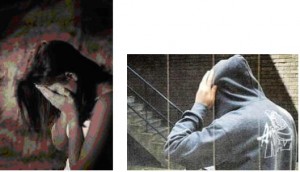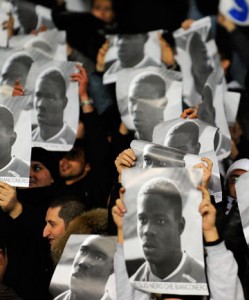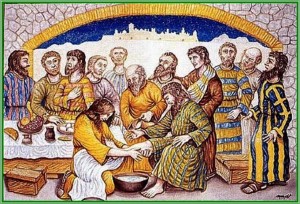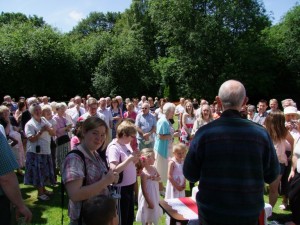On Sunday 14th August, the Church celebrated the great Feast of Our Lady’s Assumption – our Parish Feast Day – brought forward from the date of Mary’s actual feast day, Monday, the 15th. I felt that the occasion presented a challenge to me. The challenge was to ask myself, “Who is Mary for me – here, today, in my life?”
Unlike parishes in Italy, and Malta – possibly other countries – we do not ‘do’ anything special on our feast day. In many of the countries of Europe, especially those around the Mediterranean, it is usual to gather all the people together, with bands playing and a splendid procession, fireworks, and special decorations in Church; everyone turns out to celebrate. Of course, the climate in Southern Europe is much more suitable for such outside events, but also there is that difference in culture; our English psychological make-ups and temperaments are at variance with those of Italy, Spain and France, for example. However, there was a time, in England, when we were not so different. People tell me that, in the middle-ages, there were many religious celebrations on feast days, but then along came the Reformation, and this ‘put paid’ to such festivities, as the ‘cult of the saints’ was one of the things the Reformers opposed. It seems such a pity, to have lost something that was part of tradition, even here in England.
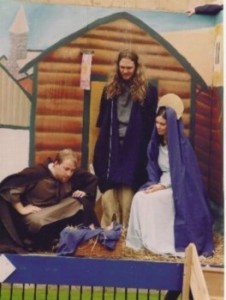 |
York Mystery play: on a wagon
However, the York medieval mystery plays have been revived in recent years, and they are a part of those older celebrations.
Forgive me – I digress – and must get back to my theme – the challenge that Mary presents! Thinking about this, I came to the conclusion that, from an early age, I ‘knew’ Mary. Always, she was like a supporter and a helper. I have a vivid memory from about 60 years ago, when I must have been only around the age of eight, of not being able to sleep that bright summer morning, when daylight came early, say at about 5.30am. I wondered what to do, and decided to challenge myself to say ALL FIFTEEN decades of the rosary! And, I did it too!
“Hail Mary, full of grace, the Lord is with you, blessed are you among women and blessed is the fruit of your womb, Jesus. Holy Mary, mother of God, pray for us sinners now, and at the hour of our death, Amen.”
In those days, the words did not mean much to me, but I thought about the mystery in each, and contemplated Mary. I remember feeling so happy that I had completed the fifteen decades; to me, it was my way of making an act of love for her, although I could not have put that into words, at so young an age. Perhaps, the happy feeling I had on completion, was her gift to me! Often in my life, I feel she has helped me, especially when things have not been going well. I think it is only natural, when problems arise, to confide in our mothers, to open our hearts to her and to ask for her help. Mary is, of course, our supernatural mother, a real person, ‘crowned’ in heaven – we Catholics believe – with a human heart beating, and any Christian is entitled to say, that heart is beating for me.
We say in the psalms:
Had we forgotten the name of our God or stretched out hands to another god
would not God have found this out, he who knows the secrets of the heart?
(Ps 43 / 44)
God knows everything, and we can have no secrets from Him. Mary is our Blessed Mother – a Mother who understands – and so we can tell her everything. She is fully united with God and, therefore, I always think it best not to try and keep secrets from Mary, as well. She always wants the good – what is best – for her children, and, through our Baptism, the life of Christ is in us. Because she is so perfectly united to Christ, so it is that, she is also closely involved in each Christian’s life. It is perfectly natural, therefore, to be ‘frank’ and ask for Mary’s help.
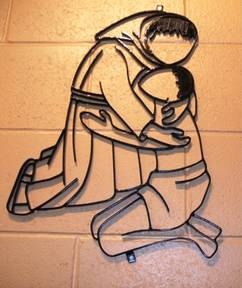 |
Listening is helpful in prison work
We, ‘Leyland monks’ have the privilege of celebrating Mass, on Saturdays, in Garth prison, and given the relatively stable population, we are fortunate to have a regular Mass attendance. We get to know each of them well, as we celebrate Mass there, on a rota system; it is something that the monks always enjoy, as the prisoners are very receptive to God’s Word.
 |
Inside and Outside a British Prison – not Garth!
On Saturday, 13 August – the day before the Feast of the Assumption – it was my turn to celebrate the Mass, and so, with the agreement of the regular ‘chaplain’, mine was a different kind of sermon – a dialogue, in fact! I asked the men, “Who is Our Lady, who is Mary for you?” They joined in much better than I expected, (though prisoners tend to be rather traditional and conservative). My warning, right at the start of Mass, must have helped them to prepare. In fact, right at the beginning of Mass, one prisoner said: “Mary, she is the Mother of God!”
The dialogue was quite successful; it produced the following comments that are quite profound and moving:
- Mary is the Mother of God, but she’s my mother also.
- As a mother always loves her children whether good or bad, so Mary loves us as her children.
- Mary is the Origin of the Church.
- Mary is an ordinary person, like us, and she was filled with God.
- Mary understands suffering because she stood at the foot of the cross.
- Mary emphasises all the female side of life in relation to us and God.
- If you want to ask God for something, go to Mary first because she will get it for you; especially if you feel not quite right with God.
- She is one who understands us.
Some of these prisoners will be deprived of their liberty for a long time. I think Jesus would have had a special love for them, and would have enjoyed meeting them. But, then, so would His Mother!
Reflecting on all these ideas, I also believe that they can be incorporated in a simple, but very meaningful way – a way that is available to each one of us – and this devolves on the word ‘Hail’ that comes off our tongues so glibly, when we say ‘Hail Mary’, or ‘Hail Holy Queen’. Increasingly, it can become our very own personal greeting to Our Lady. She is one with God in heaven; she is also ever with us as our Queen and Mother; moreover, we are all one with God, united by his grace. So here is the perfect way to greet her, just as we say ‘Hello’, ‘How are you’, or ‘Hi’ when we meet a friend. This can be our real greeting to Mary; we already know her, in the way that those prisoners describe, so beautifully, and when we truly greet her in this way, she will most certainly respond – to us, her children. How? With that sense of peace which fills our hearts, minds and spirits!
In e-mailing the blog, ‘Word Press’ tends to distort the original formatting of the document. Readers may wish to visit the website www.stmarysblog.co.uk to read it in its original format.
